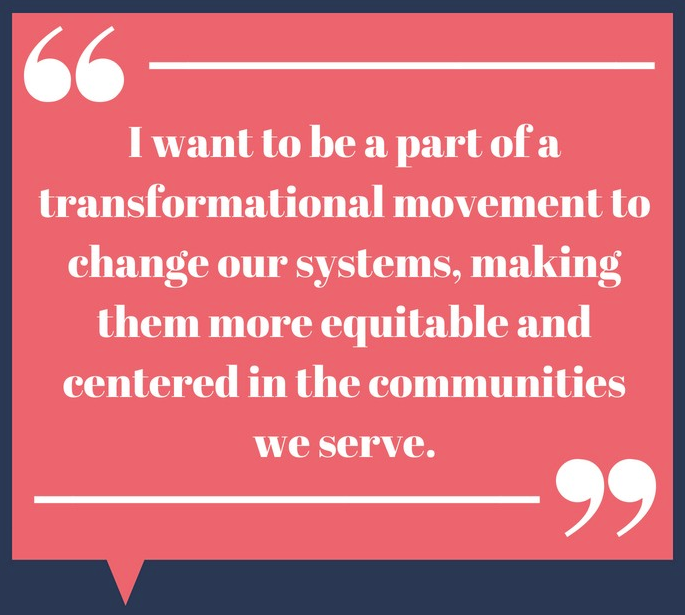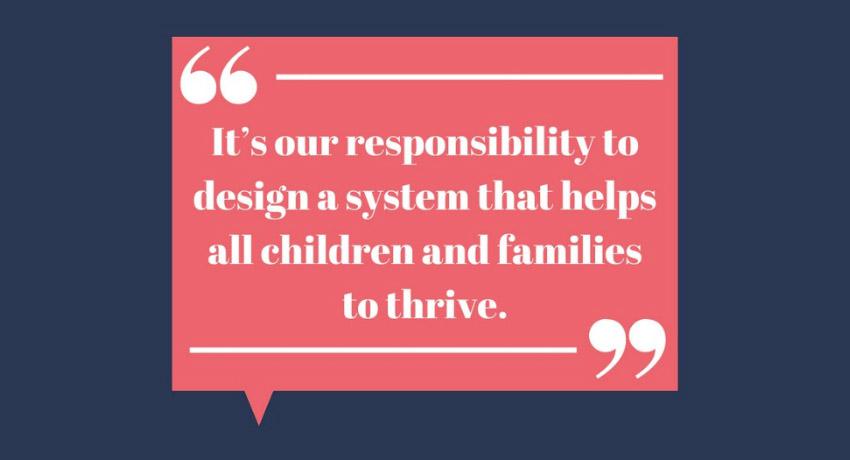In doing big projects like the DCYF creation there are tasks that have crazy deadlines (getting a payment system in place, payroll, filing new rules on time, etc.) and tasks that are often more important, but don’t have the same emergent time deadlines. It’s easy to let the latter linger. Now that we have a strong leadership team in place, I can spend some time thinking about projects that will have larger and longer-term impacts on our success. The first big one I’m taking on is our ability to recognize and address the racial inequities in outcomes for kids. Many agencies are involved in this work, and DCYF is uniquely situated to have tremendous impact on Washington’s next generation of young people.
I want to lay out a framework for thinking about our role in racial equity work. Up front, I acknowledge my white male privilege and lack of direct experience with the sorts of challenges that many of our clients are facing. Anyone who has met me knows that I own that and don’t attempt to pretend that I am anything other than who I am. I bring a certain set of skills and talents to the table, but I am not able to effect change from my experiences alone.
The data is overwhelmingly clear that children, youth, and families of color experience poorer outcomes than their comparably situated white counterparts. At almost every step in their involvement with the “system,” those outcomes get worse. These observable inequities are systematic — meaning they are seen repeatedly and over time in similar patterns. The heart of our mission is to improve outcomes for kids, and in order to get there we need to ensure that we are taking actions to reduce, not worsen, disproportionality in those outcomes. It’s our responsibility to design a system that helps all children and families to thrive.
Under my leadership at DEL we put a lot of time and resources into instituting a racial equity initiative. We are going to continue that effort and build on it to create the DCYF approach to this issue. At its core, this effort will be focused on eliminating racial/ethnic disproportionality and inequities in outcomes for kids. If we don’t bring outcome measures to the front of our conscience on a regular basis, both as individuals and as a system, we won’t make a difference. A high-level focus on identifying and addressing the underlying drivers of inequitable outcomes and overrepresentation of children of color in the child welfare and juvenile justice systems is key both to our approach and to our commitment to evaluate and adjust ongoing efforts.
In order to accomplish this large goal, we will need:
- To pay regular attention to data about outcomes for children, youth, and families. This must be disaggregated by race and ethnicity, and we must take actions focused on changing the results.
- Staffing and leadership that reflect the communities we serve. One of the best things I can do for this agency is build a strong, diverse system of leadership that will outlive my tenure. The DCYF leadership appointments are a step in the right direction, and I’m committed to putting work into adding more diversity in our management ranks as we make new hires. I’ve made sure my deputies view this as a priority as well. I won’t fire people who are doing good work to make this happen, but we need to be smart about recruiting, promoting and providing training and support for people with diverse backgrounds, experiences and thought.
- To lead for equity. We need to ensure that staff get the training and resources they need to apply a racial equity lens to all of the work we do. This entails a long-term commitment of training resources and staff time. It is one critical step to helping all of us identify and begin to mitigate our individual implicit biases and how racism shows up in our organization and systems.
At DEL these were all separate efforts. I don’t think that will work as well in a much larger organization and am asking our internal Equity and Inclusion workgroup to craft a proposal for a substantial long-term effort to create an internal oversight team to formally review our racial equity and disproportionality efforts. This team would report directly to the agency’s leadership. My view is that it would include both dedicated staff and rotating, volunteer employees from all levels of our organization. The tasks for this team would, at a minimum, could include:
- Strategy review — Regularly review our overall strategy as an agency through a racial equity lens.
- Outcome disparities and disproportionality audits — Ensure that outcomes for children match our stated goals, and are improving. This could be stand-alone reviews, inclusion of clear and consistent disproportionality metrics in other ongoing program review efforts, or other ways to audit our ongoing efforts as an agency.
- Organizational diversity analysis and recommendations — Regularly review our staff and leadership makeup and recommend strategies for hiring and retention.
- Training and staff development — Ensure we have strong and consistent training structures, expectations and materials that will help to develop and strengthen skills and competencies in racial equity, cultural competence and humility.
- Research and best practice sharing — Ensure we are up to speed on current research and best equity practices from other states and other countries, all with a focus on producing the desired outcomes
- Develop and work with an external stakeholder body — Build on the external stakeholder group that advises CA on disproportionality work. A body external to the agency can provide an important touch point for transparency and accountability.

As many of you who have met me know, I’m a numbers guy, a computer nerd and recovering politician. I’m here because I believe in the work we do, and I want to be a part of a transformational movement to change our systems, making them more equitable and centered in the communities we serve. I’m excited about the work we’re taking on together.
 Secretary Ross Hunter
Secretary Ross Hunter

